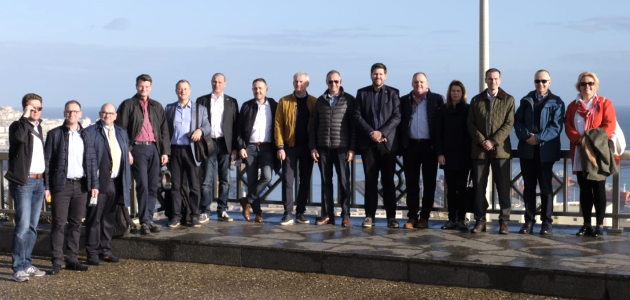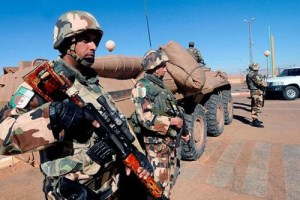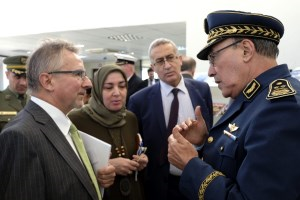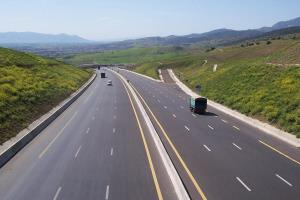The first station of the 2019 Course for Senior Officials was Algiers. The talks at Algeria's capital focused on the opening of a country that had sealed off itself for a long period of time.

Arrived at Algiers: The Study Tour's first stop was Algeria where the seminar met represenatives from government, society and business. Picture: BAKS/Weigel
The 2019 Course for Senior Officials focuses on the situation in Northern Africa. The three week-course for senior personnel from government, business, NGOs and media includes a study tour to Algeria, Tunisia, and Egypt. Thanks to the examplary support from the German Embassy at Algiers, the tours's first stage in Algeria offered a close-knit two day-schedule of high-level talks.

Algerian armed forces: The massive terrorist thread from the nineties has been curtailed today. Picture: Lamraoui.lamin/Wikimedia Commons/CC BY-SA 4.0
Representatives from the German-Algerian Chamber of Industry and Commerce and from the European Union's representation to Algeria gave first insights into the country's economic situation. A visit to the Research Center for Renewable Energy (CDER) shed light on solar power generation. In-depth dicussions with representatives from the Military Institute for Documentation, Evaluation and Foresight (IMDEP) and from the Natiol Institut for Global Strategy (INESG) also involved Algerian government officials focused on the international security situation, the fight against islamist terrorism and the containment of uncontrolled migration.
An opening process facing obstacles

BAKS President Karl-Heinz Kamp (left) during discussions with Algerian government representatives. Picture: BAKS/Weigel
From the German perspective, Algeria appeared as a stable country that has curtailed the massive terrorist threat from the nineties. After the country had sealed itself off for a long period of time, Algeria is now striving for an economic, political, and societal opening. These serious efforts, however, still face some obstacles, resulting in a protraced process. Business and investment is impeded by bureaucracy, intransparent decision-making, and inhibiting regulations, while tourism is hampered by insufficient infrastructure and visa requirements. Yet, Algeria is a sound provider of energy and natural resources, and the country does offer substantial economic prospects.

A free ride, not much traffic though: Algeria offers substantial perspectives, but its economy is also facing obstacles. Picture: Sandervalya/Wikimedia Commons/CC BY-SA 3.0
The Algerian hosts were looking at Germany with regard to increased support for transformation and, in turn, offered assistance in migration issues. With regard to migration, Algerians however emphasize that their country - in contrast to others - had never asked for financial returns and thus expect a dialogue at eye level. Hence the requirement of physical inviolabilty, imposed by German courts as a prerequisite for repatriation of declined asylum seekers to Algeria, is considered a slanderous offense by many Algerians. The same holds true for travel warnings, oftentimes leading to a feeling of being misunderstood and of being blamed for past problems which are considered solved by today. Lifting such mutual reservations was one of the major tasks of this first stage of the study tour.
Authors: Karl-Heinz Kamp and Peter Härle
